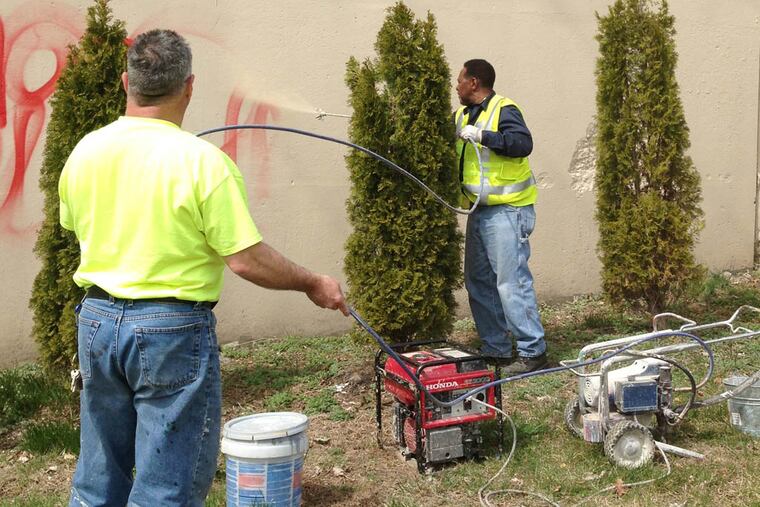
JOETTA JOHNSON hops in my car and points ahead.
Drive, she says. We're going tire hunting.
Johnson, for those of you who are new to this space, is one of the women of North Sydenham Street, a feisty group of we-will-not-be-ignoreds I wrote about when they diverted Mayor Nutter to their block to deal with a long list of long-standing issues.
Their strategy mostly worked, except for Jenesta Jones still waiting for the city to seal the exterior wall she was left with after an adjoining home was taken down. Not to nitpick, but the job is still not done, Mr. Mayor.
But back to Johnson. Within minutes, she brought us to a huge pile of tires dumped next to someone's house.
A few more turns and we were looking up at a mountain of tires at an abandoned church on the 3200 block of North 16th Street that would rival the mountain Moses climbed to get the Ten Commandments. Bet someone's regretting not adding an 11th "Thou shalt not litter" commandment.
Behind a vacant apartment building on the 1500 block of West Allegheny Avenue, hundreds of tires had been neatly, and mysteriously, stacked.
"Did you see anyone stacking these?" I asked a woman getting into a nearby car.
Nope, she shrugged. I judged her harshly until Donald Carlton, deputy commissioner of the city's Streets Department, said the city removed more than 17,000 tons of illegally dumped materials last year. So who's really going to notice one pile?
Within a day of tweeting our adventures, the piles of rubber rubbish were gone, thanks mostly to Dan O'Brien, the eagle-eyed assistant managing director of PhillyRising who reported the tires to 3-1-1 while vacationing in Anguilla.
We all know it's only a matter of time before those piles are replaced by other piles. But in this city, it's a good idea to pause for victories, however small and fleeting. Especially when it comes to battling litter.
Blight, in the form of trash, graffiti and illegal dumping, is fought in Philadelphia one day - and sometimes one imperfect program - at a time. And by imperfect, I'm speaking of the recent mattress-removal policy to curb bedbugs. Any mattresses left curbside must now be sealed in a protective wrap for pickup. But in a case of good intentions crashing into the wall of reality, people seem to be dumping the mattresses illegally to avoid paying for the $10 wrap.
Deputy Commissioner Carlton said the program just needs some time to catch on. In the few months it's been in effect, he said, he's already seen improvement. And here's hoping he's right. But in a city that already has a serious litter issue, did we really need to add one more thing people can toss?
If I sound slightly obsessed with trash, it's because I am. Litter sends one of the loudest and saddest statements about the state of a city. And the biggest statement the litter in Philly makes is one of waste. A huge waste of time, money and manpower to pick up after people who should be picking up after themselves. And that includes the sneaky commercial dumpers who think some neighborhoods are their personal dumping grounds.
Carlton couldn't tell me how much the Streets Department spends on cleaning up, but the department has at least four formal cleanup programs, including the Unlitter Us campaign that costs about $500,000 annually.
For that amount of money, we should be able to eat off the sidewalks.
Not that the city is the only one throwing loads of cash at trying to keep this city clean. A few days after I went tire hunting with Johnson, I hung out with SEPTA painters Ricky DeLarso and Charles Randolph as they removed graffiti from the East Mount Airy bridge near the Sedgwick Station.
Twice a year, three crews clean up graffiti in and around SEPTA lines to the tune of $500,000 a year, said Jeffrey D. Knueppel, SEPTA deputy general manager.
"I think we're fighting a good fight," Knueppel said. "But it's a considerable effort to stay ahead of it."
At this year's annual Philly Spring cleanup, 14,225 volunteers removed a total of 1,122,880 pounds of trash, more than 100,000 pounds more than last year.
For all of our efforts and good intentions, clearly something isn't working - the message isn't getting across, there isn't enough enforcement, something's not quite sticking, other than all that trash on our dirty streets.
After our ride-along, I checked in with Johnson to ask how things looked in her neighborhood. Any new towering piles of tires, I asked.
"Nope," she said. "But those tire dumpers better be afraid because we're watching."